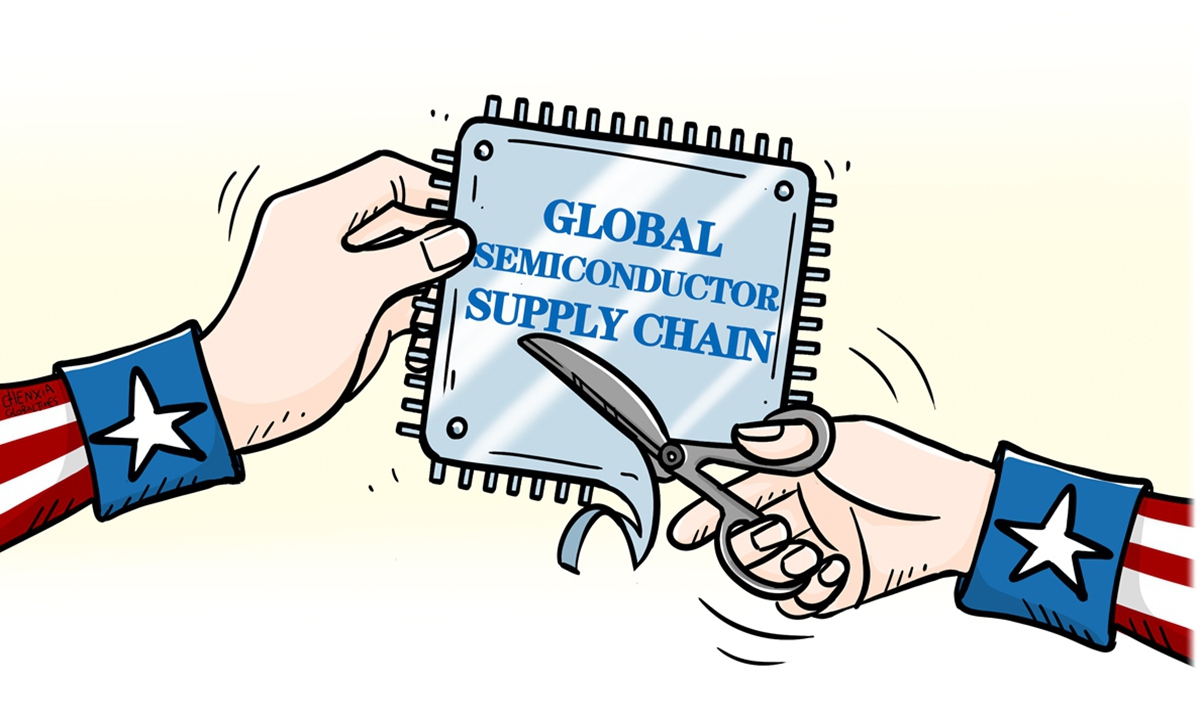
Illustration: Chen Xia/GT
US chip giant Advanced Micro Devices (AMD) may join its rivals Nvidia and Intel to modify its artificial intelligence (AI) chips to comply with US restrictions on advanced AI semiconductor sales to China. While it may reflect the importance these US chip companies attach to the Chinese market, it is by no means a long-term solution to the US chip blockade of China.
Lisa Su, CEO of AMD, said the company is mulling a similar strategy of developing AI chips specifically designed for the Chinese market, following the lead of Nvidia and Intel in complying with US export curbs while ensuring sales to China, Reuters reported on Wednesday.
"Our plan is to, of course, be fully compliant with US export controls. But we do believe there's an opportunity to develop product(s) for our customer set in China that is looking for AI solutions, and we'll continue to work in that direction," Su said on a conference call with analysts.
Ever since the US government issued various restrictions on semiconductor exports to China, redesigning chips specifically for the Chinese market has become an increasingly popular option for US chipmakers trying to maintain their presence in the world's biggest chip market. Their unwillingness to give up market share in China is indicative of the importance of the Chinese market, and the fact that the sales of US chip companies in China cannot be replaced by executive orders in the US or some subsidies. US chipmakers cannot afford to be left behind in terms of market share in China.
Yet, it should be noted that the China-specific version of the AI chips can only be a temporary solution, not a sustainable way to tackle the situation. This is because the development of low-end chips to meet US export restrictions is a huge waste of research and development resources. Also, given the speed with which the semiconductor and AI sectors have evolved, it is likely that low-end AI chips will soon fall short of Chinese demand.
With the US high-tech suppression of China, it is becoming increasingly clear that China will not necessarily buy what the US wants to export, nor will it definitely sell what the US wants to buy. One of the consequences of the US chip war is that even though we may buy AI chips specifically designed for China, we will not completely rely on US supplies and give up our own industrial chain.
Even with low-tech chips easily available in the market, it is essential for China to develop its own chip production and not to be led by the nose by others. This is the lesson that China has learned from the chip war.
Thanks to the determination to develop its own chipmaking industrial chain, China's production capacity in terms of lower-end chips has grown rapidly. In June, domestic chip output reached 32.15 billion units, up 5.7 percent year-on-year, while China's chip imports by volume declined by about 20 percent year-on-year in the first five months. The comparison between the increased domestic output and decreased imports points to a conclusion that China's chip self-sufficiency rate has increased.
Of course, that doesn't mean US chipmakers won't stand a chance of maintaining their businesses in China. If anything, they are still welcome to strengthen cooperation with local companies when it comes to the development of chip-related technologies.
For instance, Intel recently formed a partnership with the Nanshan district government in Shenzhen on the launch of the Intel Greater Bay Area Innovation Center focusing on AI, chip applications and edge computing, which marked the US chip giant's latest efforts to maintain its business ties with the Chinese market.
There was a time when China's tech industry players believed there was no need to invest in high-tech products that had already been developed by the US or other Western companies as the research and development costs far exceeded the direct procurement costs. But the chip war has completely changed that perception. The extreme suppression of China by the US has strengthened China's determination to pursue independent innovation and technological progress. China has spared no efforts to build its own chip production system to avoid being cut off from key components in the future.
US chip companies see the potential impact very clearly, and their recent talks with Biden administration officials were actually a form of self-help. Unfortunately, however, the US government is unlikely to take their interests into account in the short term, despite their claims to protect the interests of the domestic semiconductor industry.


